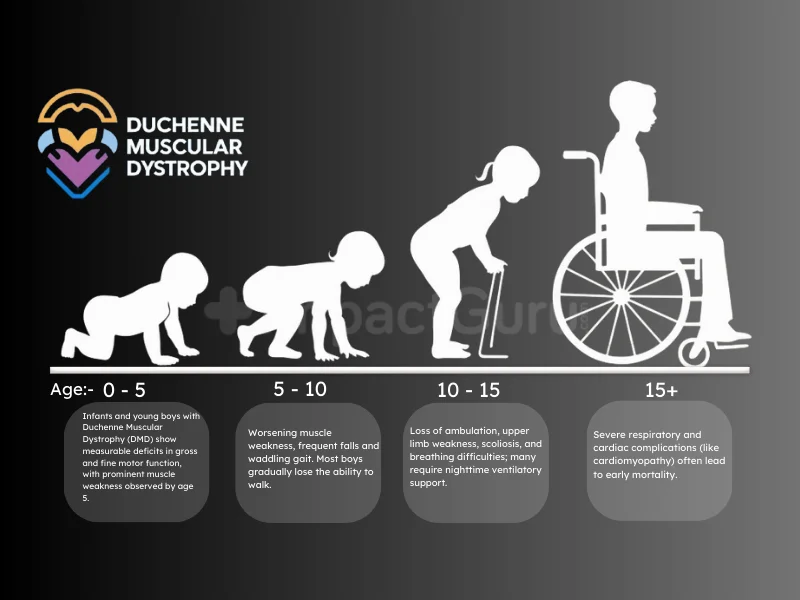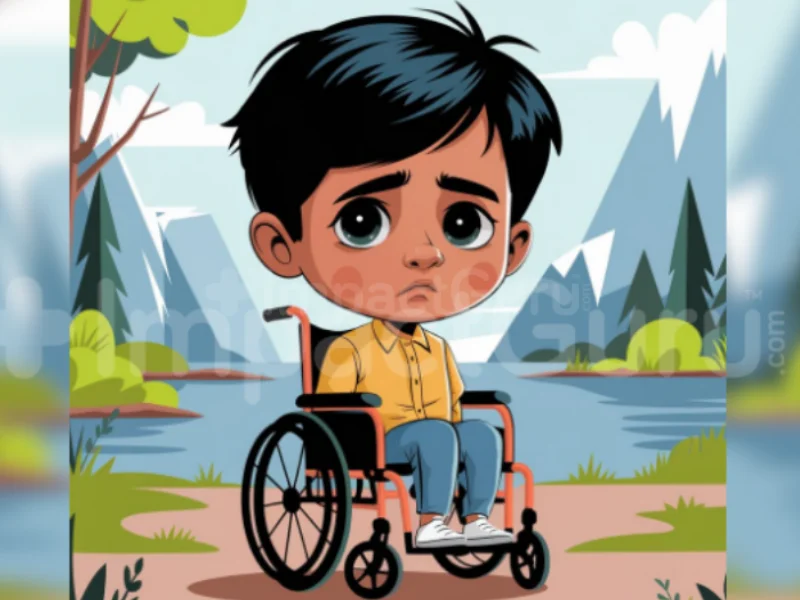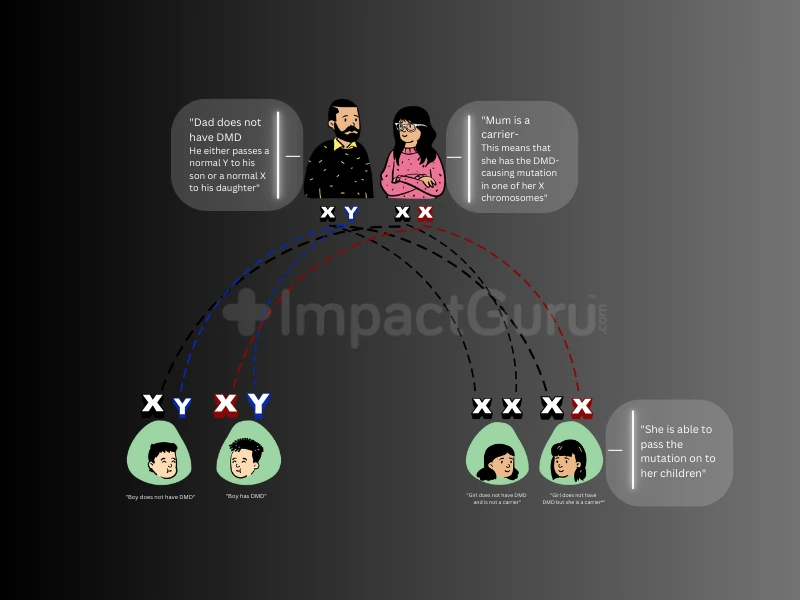Picture a little boy bursting with energy, exploring the world with curiosity. Now, imagine watching that same child gradually lose the ability to walk, run, and play. That’s the harsh reality of Duchenne Muscular Dystrophy Treatment or DMD, a progressive muscular condition that begins in early childhood. By their early teens, most Duchenne boys become wheelchair-bound.

This was just a ‘life’ example. It is also important to note that Duchenne Muscular Dystrophy is not only life-altering but also life-shortening.
Table of Contents
- What Is Duchenne Muscular Dystrophy/DMD
- Why Duchenne Muscular Dystrophy Affects Boys/ Male Child
- Treatment for Duchenne Muscular Dystrophy
- Doctors For Duchenne Muscular Dystrophy
- The best hospitals for Duchenne Muscular Dystrophy in India
- Fundraising for Duchenne Muscular Dystrophy
- What is crowdfunding?
- How can you start a fundraiser with ImpactGuru?
- More To Know –
What Is Duchenne Muscular Dystrophy/DMD
Duchenne Muscular Dystrophy (DMD) is a genetic disorder caused by changes (mutation) in the gene responsible for giving instructions to a protein called dystrophin.
What is Dystrophin?
Dystrophin is a critical component of the dystrophin-glycoprotein complex (DGC) protein that maintains the structural integrity of muscle cells. Both dystrophin and DGC are made of exons.
In boys with Duchenne Muscular Dystrophy (DMD), due to exon deletion in dystrophin and DGC proteins, muscle cells wear out and die (necrosis).
With less than 5% of optimum dystrophin levels at birth, Duchenne boys lose body function over time, making walking, climbing, or doing everyday things difficult. Even breathing and the heart rate are compromised as the body needs muscles to maintain every body function.
Read More – What Is Becker Muscular Dystrophy (BMD)?
Why Duchenne Muscular Dystrophy Affects Boys/ Male Child

Duchenne Muscular Dystrophy (DMD) is an X-chromosome-linked disorder. Boys are born with XY chromosomes. Boys/ male children inherit the X chromosomes from the mothers and Y chromosomes from the fathers.
As the mutation in dystrophin and DGC protein comes from the X chromosomes, a boy child inherits the mutation at conception and is born with exons missing from dystrophin.
While girls inherit X chromosomes from the mother and X chromosomes from the father, even if there is a mutation in the X chromosome inherited from the mother, the girl child doesn’t suffer from severe complexities. She becomes the carrier of Duchenne Muscular Dystrophy (DMD) for the next generation.
Treatment for Duchenne Muscular Dystrophy

Recently, the FDA has approved 4 drugs to treat Duchenne Muscular Dystrophy (DMD) that use exon skipping therapy: Exondys 51, Vyondys 53, and Amondys 45 from Sarepta Therapeutics, and Viltepso from NS Pharma.
In June 2023, the FDA approved Elevidys from Sarepta Therapeutics, the first-of-its-kind, gene replacement therapy drug.
Gene Replacement Therapy with Elevidys
Elevidys is a new gene replacement therapy that can help slow down the effects of Duchenne Muscular Dystrophy (DMD). It costs approximately ₹29 crore but gives families a chance to hold on to hope of a better future for their son(s).
Elevidys works by targeting the specific genetic mutations that cause Duchenne Muscular Dystrophy (DMD). The drug helps produce a partially functional version of dystrophin – a key protein for muscle strength. While it’s not a cure, it’s a step forward, potentially giving families the precious time they thought they’d lost with their child.
Also, this is a one-time drug that can be given to boys who are at least 4 years old and have a confirmed mutation in the Duchenne Muscular Dystrophy (DMD) gene.
Elevidys Cost And Availability
Elevidys, developed by Sarepta Therapeutics, received approval from the U.S. Food and Drug Administration (FDA) in June 2023. The U.S. drug is imported to India for pediatric patients aged 4 years and older with a confirmed mutation in the DMD gene. However, here’s the critical part: Elevidys comes with a hefty price of ₹29 crore, approximately.
In addition to Elevidys’ whopping cost, there is also the issue of its availability. While a one-week estimate might be optimistic, actual timelines could vary based on regulatory approvals, customs procedures, and other factors.
Elevidys is administered only once in a lifetime. It creates a partially functioning replacement gene (dystrophin).
Exon Skipping Therapy

Exon-skipping therapy allows cells to skip faulty/mutated sections of the genetic code (exon). It has emerged as another promising treatment choice. Patients with specific genetic mutations, particularly those with exon deletions, find meaningful improvement in muscle function through this therapy. Exon-skipping also slows disease progression.
Exon-skipping therapy involves intravenous infusions (IV) that need weekly administration.
How Exon Skipping Therapy Works
Imagine the Duchenne Muscular Dystrophy (DMD) gene as a long train with many bogies each carrying elements that produce dystrophin. If the connection (exons) between the bogies is damaged or missing, only a part of the train will reach its destination or derail. An engineer can fix the problem by skipping the faulty connectors. The train would then reach its destination, even with a few bogies missing.
Exon-skipping therapy takes on the same approach. The treatment allows the muscle cells to skip a defective set of exons. While as in the train’s example, skipping the faulty bits might not be perfect, the therapy can still deliver most of the dystrophin to the Duchenne boy, and improve his muscle function.
Exon-skipping therapy is a life-long treatment plan for Duchenne Muscular Dystrophy boys.

Doctors For Duchenne Muscular Dystrophy
The Indian Association of Muscular Dystrophy (IAMD) is a registered society that works in the field of muscular dystrophy and is spreading the word about the seriousness, rarity, and fatality of Duchenne Muscular Dystrophy (DMD) along with the possible/available treatment.
For early diagnosis and medical care after diagnosis, families must seek the best hospitals for Duchenne Muscular Dystrophy (DMD) in India that have experienced specialists.

The treatment of Duchenne Muscular Dystrophy (DMD) requires a multidisciplinary approach led by experienced specialists in
- Neurology– A neurologist is a medical specialist who diagnoses and treats disorders affecting the brain, spinal cord, peripheral nerves, and muscles.
- Paediatrics – A paediatrician is a doctor who treats newborns, children, adolescents and young adults.
- Orthopaedics – An orthopedist treats injuries and diseases of muscles, bones, joints, ligaments, and tendons.
- Pulmonology – A pulmonologist treats breathing problems and lung conditions.
- Physiotherapy – A physiotherapist is a specialist who helps people recover from injuries, reduce pain, and improve movement through exercises and stretches.
- Occupational therapy – An occupational therapist helps people build skills and adapt to handle daily activities, like school, work, or hobbies, especially when they have challenges from an injury, illness, or disability.
- Medical genetics– A medical geneticist is a doctor who specializes in diagnosing and treating genetic disorders or conditions.
The best hospitals for Duchenne Muscular Dystrophy in India
The best hospitals for Duchenne Muscular Dystrophy (DMD) in India cover every aspect of Duchenne Muscular Dystrophy (DMD), guiding the child, the family and the caregivers, supporting them through treatment and counselling, sharing medical updates/research findings, guiding the family to choose the right kind of therapy for the child and making the treatment accessible for him.
It becomes the duty of the team of medical experts to make the family aware of how to access gene therapy for Duchenne in India.
With medical advances in the country, several health centres are committed to treating Duchenne muscular dystrophy.
- Apollo Hospitals
- Max Hospitals
- Medicover Hospitals
- Elantis Hospital
- Manipal Hospital Delhi
- BGS Gleneagles Global Hospitals
- BLK-Max Super Speciality Hospital
- Ruby Hall Clinic
- Fortis Malar Hospital Adyar Chennai
- Rainbow Children’s Hospital
- MIOT International
- NeuroGen Hospital
As discussed before, gene replacement therapy and exon-skipping therapy are the main treatments for Duchenne Muscular Dystrophy (DMD). They slow the onset and progression of this rare condition.
Although both Elevidys and exon-skipping have brought hope to patients with Duchenne Muscular Dystrophy (DMD), the cost of both gene replacement therapy with Elevidys and exon-skipping with Exondys 51, Vyondys 53, Amondys 45, and Viltepso is an expensive affair.
For the DMD-affected families, the journey to Duchenne Muscular Dystrophy (DMD) gene therapy is tough but not impossible. Patient advocacy groups, such as Duchenne Muscular Dystrophy (DMD) support organisations, are stepping in with financial assistance and guidance.
On top of the high cost, getting these drugs can also be a struggle. Since they’re imported from the U.S.A. they must go through customs checks and other procedures.
Government healthcare schemes exist but there is a lack of awareness. This blog attempts to decode DMD for families in India and show them some light in the dark.
Fundraising for Duchenne Muscular Dystrophy
Most families cannot wrap their heads around the massive funds’ requirement for Elevidys and exon skipping therapy, let alone afford it.
That is why fundraising has become critical for families facing the staggering costs of Duchenne Muscular Dystrophy (DMD) treatments like Elevidys and exon-skipping therapies. With treatment costs ranging into crores of rupees, many families find themselves in a seemingly impossible financial situation.
These aren’t just medical expenses, they’re dreams hanging in the balance. A single treatment could cost more than what most families will earn in their entire lifetime.
That is where crowdfunding platforms like ImpactGuru come in and make fundraising for DMD treatment a vital pathway for families to access life-changing treatment.
What is crowdfunding?
Crowdfunding is the magic where people known to the campaigner or unknown to them, donate to their cause on an online platform because the cause resonates with them. The more the number of donors and social media shares, the sooner the goal amount is reached.
Crowdfunding is heaven-sent when it comes to medical fundraising where families may lack sufficient funds or may have exhausted their savings while catering to their loved ones’ treatment. So, when a loved one’s life is on the line, crowdfunding on a reputed online platform like ImpactGuru can prove helpful.
ImpactGuru is the crowdfunding platform in India that has emerged as a crucial medium for families raising crores worth of treatment for rare illnesses like DMD. Here’s how families can effectively use ImpactGuru to raise funds for DMD treatment:
How can you start a fundraiser with ImpactGuru?
- Visit ImpactGuru’s website and select the ‘Start a fundraiser’ option.
- Create a detailed profile by filling in your details and explaining the child’s condition.
- Set a fundraising goal based on treatment costs.
- Upload medical reports and treatment.
- Add high-quality, emotional photographs.
Fundraising Strategies
- Share the fundraiser on social media platforms.
- Engage family, friends, and networks.
- Give updates for the fundraiser regularly with the child’s progress and treatment journey.
Benefits of starting a fundraiser with ImpactGuru
- ImpactGuru’s platform provides tax benefits for donors.
- Offers secure payment gateways and multiple payment methods.
- Provides support in campaign management.
More To Know –
Here are some of the drugs that were approved recently –
- Amondys 45: Approved in February 2021 for patients amenable to exon 45 skipping.
- Viltepso: Approved in August 2020 for patients amenable to exon 53 skipping.
- Vyondys 53: Approved in December 2019 for patients amenable to exon 53 skipping.
- Exondys 51: Approved in September 2016 for patients amenable to exon 51 skipping.
According to the Ministry of Health and Family Welfare, Government of India, based on the current prices of these drugs and the patient’s weight, the cost of treatment with these newer disease-specific therapies can range from approximately ₹5 to ₹10 crores per year.
Research Source:
Duchenne Muscular Dystrophy (DMD)
FAQs
Duchenne Muscular Dystrophy (DMD) is a rare genetic disorder that causes progressive muscle weakness and degeneration, primarily affecting boys. It leads to loss of mobility and, without treatment, can reduce life expectancy. Early diagnosis and intervention are crucial.
Symptoms of DMD typically appear between 2 to 5 years of age and may include:
Delayed motor milestones (e.g., walking)
Frequent falls and difficulty getting up
Muscle weakness, especially in the hips, thighs, and shoulders
Enlarged calf muscles
Gowers’ sign (using hands to push off the thighs to stand)
If you notice these signs, consult a pediatric neurologist for evaluation
Treatment for DMD in India includes:
Gene Replacement Therapy (e.g., Elevidys): A one-time treatment that costs approximately ₹29 crore.
Exon Skipping Therapies (e.g., Exondys 51, Vyondys 53): Target specific genetic mutations to slow disease progression.
Stem Cell Therapy: Emerging treatment options with varying costs.
Supportive Therapies: Physiotherapy, respiratory support, and cardiac care to manage symptoms.
The choice of treatment depends on the patient’s age, mutation type, and disease progression.
The cost of DMD treatment in India varies:
Gene Replacement Therapy: Approximately ₹29 crore for Elevidys.
Exon Skipping Therapies: Costs can range from ₹2 to ₹3 crore annually.
Stem Cell Therapy: Costs vary based on the clinic and treatment protocol.
These expenses can be overwhelming for families, making crowdfunding a viable option.
Yes, crowdfunding has been instrumental in raising funds for DMD treatments in India. Platforms like ImpactGuru have facilitated campaigns that have successfully funded treatments costing crores. For instance, a campaign raised ₹9 crore for a child with Spinal Muscular Atrophy, highlighting the potential of crowdfunding for rare diseases.
Starting a fundraiser on ImpactGuru is straightforward:
Visit ImpactGuru.com.
Click on “Start a Fundraiser”.
Fill in the campaign details, including the patient’s story, treatment costs, and supporting documents.
Share the campaign link with friends, family, and social media networks.
ImpactGuru provides guidance and support throughout the fundraising process.
To initiate a fundraiser for DMD treatment, you will need:
Medical reports confirming the diagnosis of DMD.
Estimates or bills from hospitals detailing the treatment costs.
Patient’s identification and address proof.
Bank account details for fund transfer.
Consent from the patient’s guardians.
Ensure all documents are clear and legible to avoid delays.
Yes, the Government of India has initiatives for rare diseases:
Digital Portal for Crowdfunding & Voluntary Donations: Facilitates donations for patients with rare diseases.
Centres of Excellence: Specialized centers providing treatment for rare diseases.
Financial Assistance: Some states offer stipends and support for rare disease patients.
It’s advisable to check with local health departments for specific schemes available in your area.
Without treatment, children with DMD typically lose the ability to walk by 12 years and may experience life-threatening complications in their early 20s. However, with early intervention and appropriate treatment, many children can lead longer, more active lives.
You can support DMD awareness by:
Sharing information about DMD on social media.
Participating in or organizing awareness campaigns and events.
Supporting organizations like PPMD India and BharathMD Foundation.
Donating to crowdfunding campaigns for DMD treatment.
Every effort helps in spreading awareness and supporting families affected by DMD.












